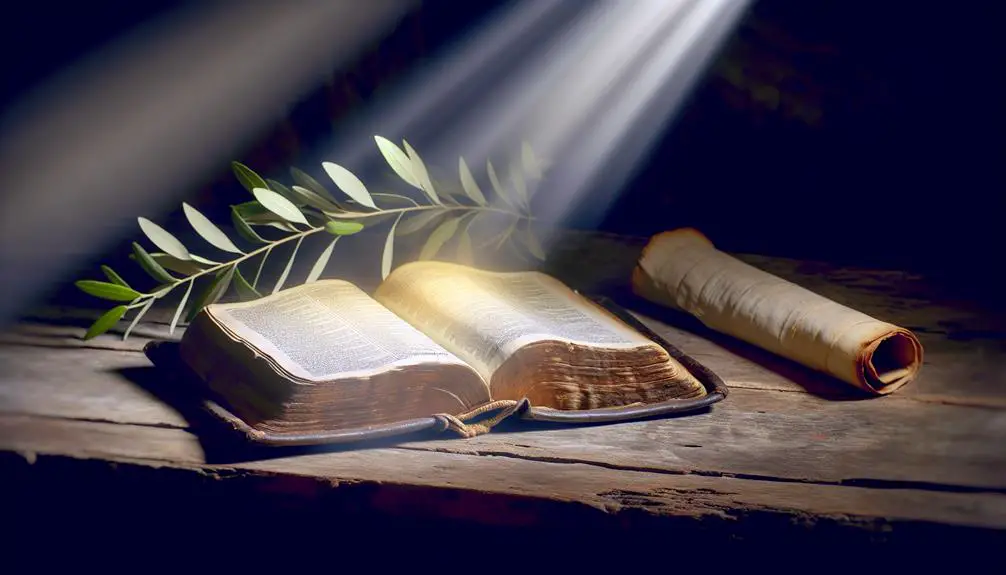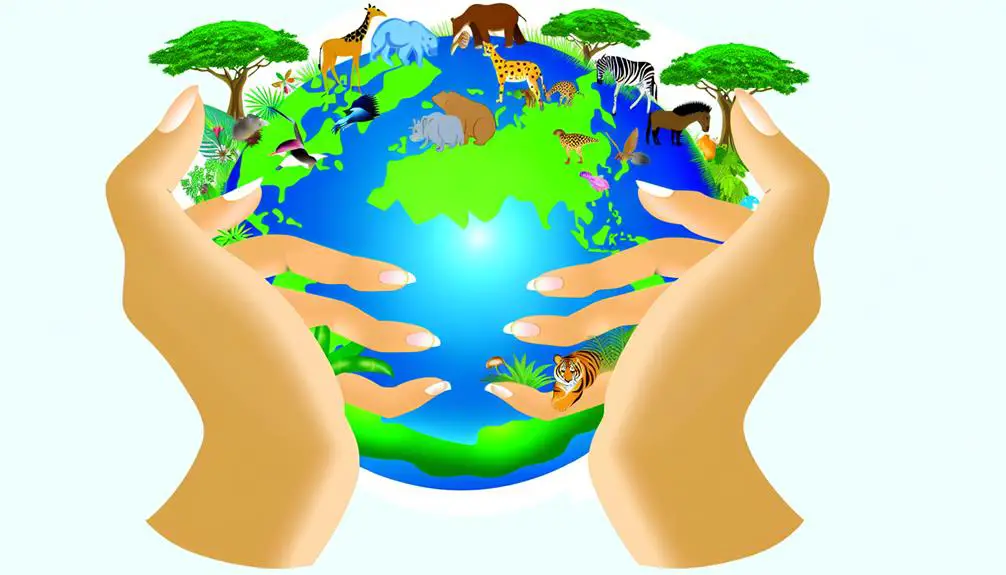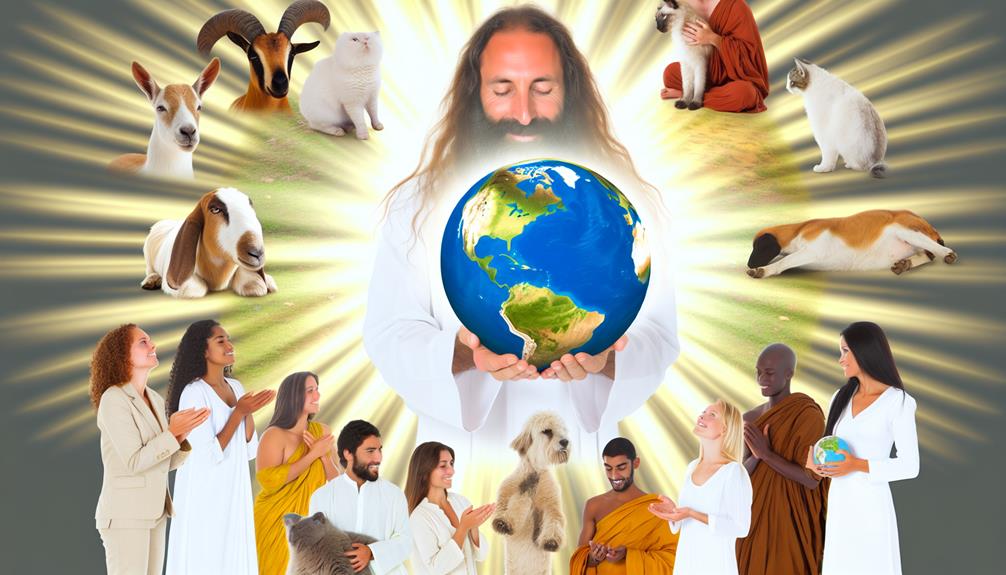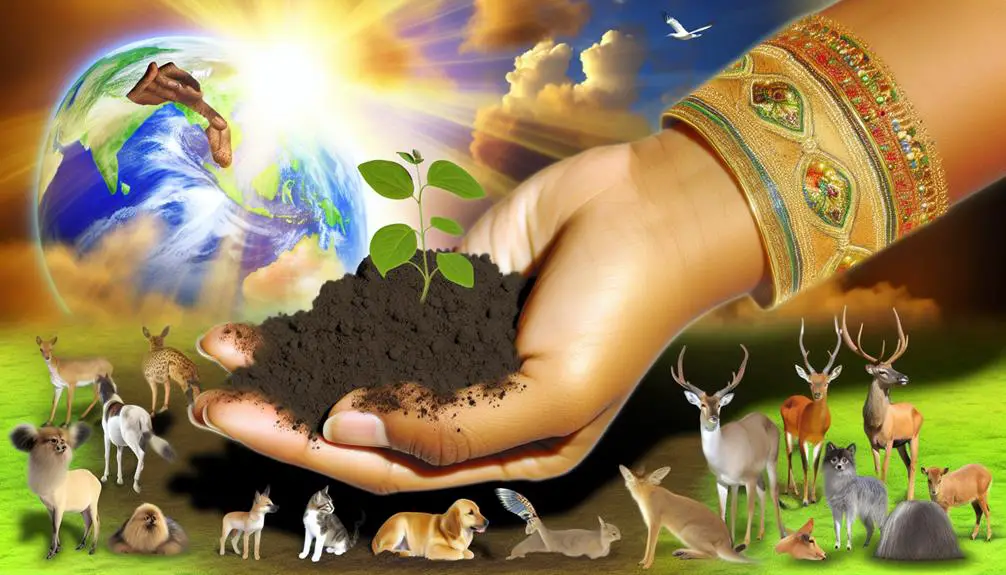Investigate the profound meaning of 'dominion' in the Bible and its lasting impact on ethics and environmental stewardship—discover why it's crucial today.

Meaning of Dominion in the Bible
A recent survey found that over 60% of people have encountered the term 'dominion' in the Bible but aren't clear on its full implications. You might find it intriguing to explore how this concept has evolved from its origins in Genesis to its interpretations through the ages.
The idea of dominion, often linked with authority and stewardship, plays a significant role in understanding humanity's place in the world and our responsibilities towards it. As we unpack the biblical context, interpretations by theologians, and modern perspectives, you'll discover how this ancient directive influences contemporary discussions on environmental stewardship and ethical leadership.
Let's consider what dominion truly means and why it matters more than you might think.
Key Takeaways
- Dominion in the Bible implies stewardship, emphasizing nurturing and preserving creation, not exploitation.
- Interpretations of dominion have evolved from hierarchical to emphasizing coexistence and stewardship.
- Jesus' teachings reframe dominion as service and love, challenging traditional power dynamics.
- Modern Christian perspectives advocate for responsible governance and environmental stewardship under God.
Origin and Definitions

The term 'dominion' in the Bible originates from the Hebrew word 'radah' and the Greek word 'kyrieuo,' both conveying the notion of ruling or having authority over something. These linguistic roots reveal a profound understanding of power dynamics within ancient cultures, emphasizing a hierarchical relationship between humanity and the rest of creation. The Hebrew 'radah' encapsulates the idea of subjugation and reigning, which reflects the cultural perspective of humans being appointed as stewards over the earth. Similarly, the Greek 'kyrieuo' suggests a mastery or lordship that was understood within the context of societal and familial structures of the time.
Your exploration into these terms uncovers a layered interpretation of authority that was deeply entrenched in the cultural and religious practices of these ancient communities. The integration of 'dominion' within biblical texts can't be seen as a mere linguistic coincidence but as a deliberate choice that mirrors the prevailing cultural influence. This influence shapes the way authority and stewardship are conceptualized, highlighting a complex interplay between divine command and human responsibility.
Through this lens, you grasp how deeply cultural contexts and linguistic nuances inform the biblical concept of dominion, offering a rich tapestry of meanings that transcend a simple command to rule.
Dominion in Genesis
In Genesis, the concept of dominion is intricately defined, setting a foundational framework for humanity's relationship with creation.
You'll find that it explicates humanity's role not as conquerors, but as stewards tasked with the care of Earth's flora and fauna.
This stewardship implies a divine mandate for sustainable care, highlighting the balance between use and preservation.
Genesis Dominion Defined
Frequently, scholars interpret dominion in Genesis as humanity's divine mandate for stewardship and authority over the Earth. This interpretation aligns with dominion theology, which posits that humans are to exercise sovereign rule in a manner that reflects divine principles. The concept of dominion in Genesis is multifaceted, embodying:
- Stewardship: The responsibility to care for and maintain the Earth's resources.
- Authority: The power to govern the Earth's creatures and land.
- Sovereignty: Reflecting God's ultimate rule through human governance.
These elements together suggest that dominion isn't about exploitation but about responsible management and leadership. Understanding dominion in this light underscores the biblical call to stewardship, framing humanity's authority as a sacred trust rather than a license for unchecked exploitation.
Humanity's Role Explained
While exploring the concept of dominion in Genesis, it's crucial to understand how this divine mandate intricately positions humanity as both caretakers and governors of the Earth. Dominion theology and the Cultural mandate are foundational to comprehending your role in this dynamic. You're tasked with stewardship that balances governance and care, reflecting divine intent through your interactions with the natural world.
Aspect |
Description |
|---|---|
Dominion Theology |
Positions humanity as responsible governors under God. |
Cultural Mandate |
Encourages cultural development in harmony with creation. |
Stewardship |
Balances use and preservation of the Earth's resources. |
Governance |
Involves making decisions that impact creation positively. |
Care |
Requires a nurturing approach to all aspects of the natural world. |
This framework isn't just about authority; it's about responsibility, highlighting your role in a divinely ordered cosmos.
Creation's Care Imperative
Understanding the imperative of creation's care within the context of Genesis reveals a profound responsibility placed upon humanity to nurture and protect the natural world. This stewardship, often misunderstood, calls for a balanced approach that respects the integrity of all creation.
- Sustainable living becomes a theological as much as a practical necessity, echoing the Genesis mandate for care and preservation.
- Climate change challenges are a direct call to action, urging a reevaluation of how you live in harmony with the environment.
- The concept of dominion mandates not exploitation but a guardianship that fosters life and health across ecosystems.
Such an interpretative lens compels a reimagining of humanity's role in the world, underscoring the urgent need for an ethic of care that transcends mere utilitarian use to a deeply ingrained responsibility for every living thing.
Interpretations Through Ages
How has the interpretation of dominion evolved throughout history in the context of biblical texts? Initially, dominion theology took a forefront, especially in early Christian interpretations, suggesting a hierarchical order with humans at the peak, mandated to rule over nature. Cultural shifts, however, have nuanced this understanding considerably.
Era |
Interpretation of Dominion |
|---|---|
Early Christianity |
Emphasized hierarchical dominion; humans above all creation. |
Medieval Period |
Dominion intertwined with stewardship, but still human-centric. |
Industrial Revolution |
Exploitative views surged; dominion as justification for environmental degradation. |
Contemporary |
Shift towards stewardship and coexistence; questioning anthropocentric interpretations. |
This evolution reflects broader theological and philosophical shifts. In early Christianity, dominion was often seen as a divine endorsement for unequivocal human authority over the natural world. As centuries passed, the intertwined relationship between dominion and stewardship became slightly more pronounced, albeit still under a human-centric framework. The Industrial Revolution marked a period where dominion was used to justify rapid industrialization and environmental exploitation, often devoid of ethical consideration for nature. In contemporary times, there's a growing push towards reinterpreting dominion not as absolute control, but as a call for responsible, ethical stewardship, highlighting a profound shift towards recognizing the intrinsic value of all creation.
Dominion and Stewardship

You'll find that the Biblical concept of dominion isn't a carte blanche for exploitation but intertwines closely with stewardship responsibilities. This nuanced interpretation suggests you're called not just to rule over creation but to nurture and protect it, highlighting a symbiotic relationship.
Understanding your role within this dynamic sheds light on the broader theological implications of human interaction with the natural world.
Biblical Dominion Defined
In biblical texts, the concept of dominion encapsulates both authority over and responsibility for the Earth, suggesting a nuanced relationship between humans and the natural world. This duality introduces complex dominion ethics and power dynamics that demand careful interpretation.
- Dominion as Caretaking: Rather than absolute control, dominion implies a stewardship role where humans are to nurture and preserve.
- Power Dynamics: The authority granted isn't for exploitation but for the balanced and ethical management of resources.
- Ethical Implications: Understanding dominion involves recognizing the moral obligations that accompany power.
Stewardship Responsibilities
While the concept of dominion outlines humans' authority over Earth, it inherently calls for a stewardship that emphasizes care and preservation rather than exploitation. This stewardship isn't merely an ethical directive but carries profound economic implications. By adopting a mindset focused on sustainability, you're encouraged to explore innovative solutions that ensure resources remain abundant for future generations. This approach not only secures economic stability but also promotes a healthier planet.
Cultural interpretations of dominion further enrich this understanding, illustrating how diverse communities perceive their role as Earth's caretakers. These perspectives often highlight the interconnectedness of all life, urging a balance that respects both human needs and environmental integrity. Thus, stewardship responsibilities transcend mere dominion, embodying a holistic approach to living harmoniously within the world's ecosystems.
Human Role in Creation
Understanding the human role in creation requires a deep dive into the intertwined concepts of dominion and stewardship, which dictate our authority and responsibilities towards Earth. This dual mandate doesn't just grant us the right to rule but also entrusts us with the care of our environment and all within it. Here's how you fit into this grand design:
- Animal companionship isn't merely about dominion but a symbiotic relationship where animals fulfill our emotional and physical needs while we ensure their protection and welfare.
- Cultural mandates beckon us to cultivate the earth, encouraging innovation and development that harmonize with creation.
- Responsibilities towards environmental stewardship emphasize a sustainable approach, ensuring that our dominion doesn't lead to exploitation but nurtures and preserves for future generations.
In embracing these roles, you're honoring the delicate balance between dominion and stewardship.
Jesus' Teachings on Dominion

Jesus' teachings often reframed the concept of dominion, emphasizing stewardship and service over traditional notions of power and control. Through miraculous healings and parable teachings, he illustrated a dominion rooted in compassion and humility rather than dominance. His healings weren't mere displays of power but acts of mercy that restored individuals to their communities, challenging the prevailing social hierarchies. Each miracle served as a testament to a kingdom where love and healing underscored authority.
Similarly, Jesus' parables, rich in metaphor and meaning, further dissected the nature of dominion. They portrayed a world where the last would be first, and the first last, a radical inversion of societal expectations. Through stories of the Good Samaritan or the Prodigal Son, Jesus advocated for a dominion exercised through love, forgiveness, and inclusivity.
Analyzing Jesus' approach reveals a profound redefinition of dominion. It's a concept not of subjugation but of stewardship, not of hierarchy but of service. This perspective invites you to see dominion not as a right to exploit but as a responsibility to care and serve, echoing the deepest values of the kingdom he proclaimed.
Modern Christian Perspectives
Building on Jesus' redefinition of dominion as stewardship and service, modern Christian perspectives continue to explore and expand this concept, grappling with its implications in contemporary society. You'll find that today's interpretations aren't just about physical or spiritual realms but also extend into the digital and cultural spheres. This evolution reflects broader societal changes and challenges Christians to rethink traditional understandings of dominion.
Key areas of focus include:
- Digital Dominion: Understanding stewardship in the age of the internet and social media. Christians are navigating how to responsibly use technology to spread the Gospel, connect communities, and foster positive change, all while avoiding the pitfalls of digital environments.
- Cultural Interpretation: Engaging with and interpreting dominion through the lens of current cultural dynamics. This involves discerning how to apply biblical principles of stewardship and service in a culturally diverse and ever-changing global landscape.
- Service and Stewardship: Reaffirming Jesus' teachings as a foundation for action in the modern world. This perspective emphasizes serving others and caring for creation as central to exercising dominion.
In this light, modern Christian perspectives on dominion challenge believers to embody stewardship and service in all areas of life, promoting a holistic approach that's reflective, adaptive, and faithful to biblical teachings.
Ecological Implications

In exploring the concept of dominion, it's crucial to examine its ecological implications, particularly how this biblical principle guides Christians in addressing environmental stewardship and conservation. The notion of dominion, as presented in the Bible, often sparks debates on its meaning and application, especially in the context of modern ecological crises such as climate change and species extinction. You might interpret dominion as a call to responsible stewardship, where humans are tasked with preserving the integrity of creation, rather than exploiting it.
Analyzing the ecological implications of dominion requires a deep understanding of the interconnectedness of all life forms. Climate change, a pressing issue of our time, calls for a collective response that aligns with the biblical mandate to protect and sustain the Earth. Similarly, the alarming rate of species extinction challenges you to reconsider your actions and their impact on the planet's biodiversity.
Thus, the biblical concept of dominion doesn't justify reckless exploitation but rather implies a sacred duty to safeguard the environment. It's a call to action against the ecological degradation that threatens the very fabric of creation. Embracing this interpretation can inspire meaningful change, urging a shift towards sustainable living and a deeper respect for the natural world.
Applying Dominion Today
Understanding the ecological implications of dominion sheds light on how this biblical principle can be applied in today's environmental challenges. You're tasked with stewardship, an obligation that extends beyond mere control to a responsibility for nurturing and preserving the environment. This stewardship involves a delicate balance, ensuring that economic implications don't outweigh the care for creation.
In applying dominion today, consider the following aspects:
- Economic Implications: Sustainable practices can coexist with economic growth. By prioritizing renewable resources and eco-friendly technologies, you're not just protecting the environment but also paving the way for new industries and job opportunities.
- Societal Structures: The concept of dominion encourages a restructuring of societal norms and values towards a more sustainable and equitable framework. This involves advocating for policies that protect the environment and ensure fair access to natural resources.
- Personal Responsibility: Each individual has a role in exercising dominion through daily choices, from reducing waste to supporting sustainable businesses.
Frequently Asked Questions
How Has the Concept of Dominion Influenced Legal Systems and Governance in Historically Christian Nations?
In historically Christian nations, the concept of dominion has significantly shaped legal frameworks and governance evolution. You'll find its influence deeply embedded in the development of laws and policy-making processes.
This concept fostered a sense of responsibility and stewardship over land and resources, guiding the ethical and moral underpinnings of societal rules. It's led to a nuanced balance between authority and the welfare of communities, reflecting in modern legal systems.
In What Ways Have Non-Christian Religions or Belief Systems Interpreted or Responded to the Judeo-Christian Concept of Dominion?
Imagine standing at a crossroads where diverse paths of belief intersect. You're exploring how non-Christian religions perceive dominion.
Islamic stewardship and Hindu karma offer distinct lenses. Islamic traditions emphasize stewardship of the Earth, entrusting humans with its care, not domination. Hinduism's karma intertwines with duty, suggesting a harmonious balance with nature rather than control.
These perspectives challenge and enrich the dialogue, broadening your understanding of humanity's role in stewarding our planet.
Can the Concept of Dominion Be Reconciled With Contemporary Animal Rights Movements, and How Have Christian Communities Engaged With This Challenge?
You can see the concept of dominion evolving within Christian communities as they grapple with animal rights movements.
This reflects a broader ethics evolution, where traditional views are being questioned.
Christian engagement varies, with some seeing stewardship as synonymous with animal welfare, thus reconciling dominion with contemporary ethical standards.
This analytical approach highlights the dynamic nature of religious interpretation in the face of modern ethical challenges.
How Has the Theme of Dominion Been Portrayed or Critiqued in Popular Culture, Literature, and Art Throughout History?
In the tapestry of human expression, dominion symbolism weaves a complex narrative. You'll find it's both lionized and lambasted across cultural landscapes. From literature's profound critiques to art's subtle jabs, dominion's portrayal has evolved.
It's not just a theme; it's a mirror reflecting humanity's grappling with power and stewardship. Analyzing these representations, you uncover a rich tapestry of cultural critique, where each thread questions our relationship with the natural world.
Are There Any Documented Shifts in the Understanding of Dominion Among Different Christian Denominations Over the Past Century, Particularly in Response to Global Crises Such as Climate Change?
You've noticed that Christian denominations have indeed shifted their understanding of dominion, especially in the face of global crises like climate change. This evolution reflects a deeper engagement with Dominion theology and Ecumenical perspectives, signaling a move towards stewardship rather than dominion.
This shift isn't just theological; it's a practical response to environmental concerns, illustrating how faith communities adapt their interpretations to address contemporary challenges.
Conclusion
In essence, you've traversed the rich landscape of 'dominion' in the Bible, uncovering its multifaceted meanings. From Genesis to Jesus' teachings, the concept has evolved, urging a balance between dominion and stewardship.
In today's world, this ancient directive calls for a harmonious relationship with nature, echoing the need for responsible guardianship over creation. As stewards, you're beckoned to tread lightly on the earth, embodying the wisdom of ages in your interaction with the natural world.
Let's not forget, with great power comes great responsibility.



Sign up